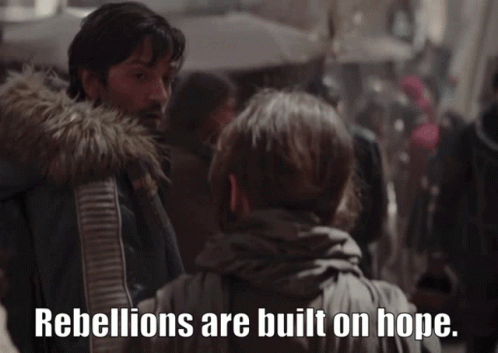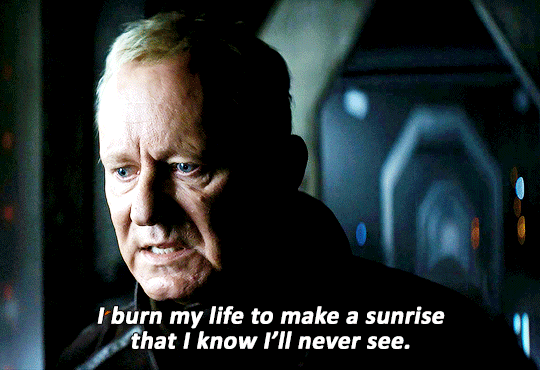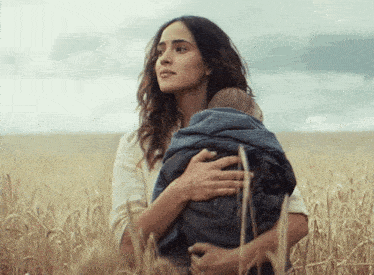Rebellions Are Built on Hope
This is just one of many moments during the TV series “Andor” that feels transcendent. As my husband and I made our way through this series, there were many lines and scenes that made us inhale sharply or our jaws drop because we connected so deeply with the emotions and message of the story.
Shows like Andor help us make sense of our own lives and reality. They engage our emotions to allow us to process our angst, lament, or joy. They help us acknowledge the messiness of our own humanity and recognize the work of evil, while empowering us to imagine what could be instead.[1]
Andor is rich with these “points of connection” between the story, our day-to-day life, and larger theological themes, one of the most prevalent being that “Imagination is resistance”.[2] In this post, I’ll use what Gordon Lynch calls a “textual” analysis of pop culture[3] to explore hope as resistance in Andor and in the Church.
Part of the appeal of TV is its ability to help us make meaning of stories as we know they will have some kind of closure in the end.[4] This rings true in Andor, as it is situated between the events of Star Wars Episodes I-III and the events of Rogue One and Star Wars Episodes IV-VII. In fact, Cassian Andor repeats the mantra “Rebellions are built on hope” to another character in Rogue one, showing how he has internalized this message. And the next movie chronologically in the franchise is aptly named, “A New Hope”.
The context of Andor in the larger narrative means the audience is aware:
1. Cassian Andor and his friends die in the middle of the story.
2. The Rebellion wins at the end of the story.
The show lives in the shadow of our awareness that these characters who we are getting to know and love and empathize with do not live to see the fruit of their Rebellion. But we are also aware that, in the end, it does succeed because of their efforts, sacrifices, and the larger forces (perhaps even “the Force”) at work for freedom and flourishing for the people of the Galaxy.
I can’t help but draw connections to the life of the Christian and the community of the Church. We know that we will die before we fully see God’s Kingdom come on earth. But we also believe with hope, as the Rebels do, that this Kingdom is actively coming and one day this Kingdom WILL fully come, and that changes everything about how we operate here and now; we see this reflected in the Rebellion in several ways.
One thing Andor demonstrates is that in acknowledging the reality of evil, we are freed to imagine that things could be different. The first season shows Cassian being confronted with the injustices and oppression of the Empire contrasted with the conviction, idealism, and hope of the Rebellion. When he sees their small victories and begins to understand that they must win, this ultimately leads to him joining them. Similarly, in Season 2, Senator Mon Mothma gives a moving speech about the nature of truth and lies, urging her fellow Senators to open their eyes and see the deception and evil around them for what it really is, so that they can do something about it.
Part of the role of the Church is our willingness to look at the world and ourselves and be honest about what is wrong and how evil might be harming people, without needing to shut our eyes to the reality or choose to just accept the way things are and wait for a better day. The Cross and Christ’s death is the ultimate instance that reveals just how ugly, violent, and damaging evil is. But by exposing evil’s nature, it begins to be stripped of its power and seeming inevitability.[5] And in confronting evil, we are freed to rebel against it as we imagine that things could, should, and in fact will one day inevitably be good.
Andor poignantly tells the story of ordinary people who become more as they join together motivated by a larger mission and purpose. The Rebels in Andor are not Jedi or Emperors or Lords or royalty, they are everyday people – thieves, mechanics, spies, senators, pilots, youth, shop keepers, farmers, a bellhop. The characters in Andor are flawed; they kill, they lie, they fail, and they have differences in how they believe their goals should be accomplished. But nonetheless, each brings their own strengths and resources to the Rebellion, joining together because they believe in its mission of hope.
The same may be said for the Church. We are a community of many different parts, who are flawed and who disagree amongst ourselves. But we are joined together because of the work of Christ and the ongoing presence of the Spirit empowering us for a mission larger than any individual. Each rebel’s ordinary steps against the “powers and principalities”[6] (or “Empires”) that keep people in fear, violence, or shame contributes to painting a picture of a hopeful future.
In Season 1, Episode 10, “One Way Out” Luthen Rael tells one of his Rebel spies, “I burn life to make a sunrise that I know I’ll never see”. His words are nearly prophetic as he does end up sacrificing his life, as well as his conscience and ideals, to save the Rebellion. In their own way, each character in Andor does the same. Mon Mothma sacrifices her safety and status to funnel resources to the Rebel army. Kino Loy sacrifices his life to help his fellow prisoners escape, though he knows he cannot. Kleya gives her entire life, from childhood, to join Luthen. Vel sacrifices her love and her friends. Bix sacrifices her home and a future with Cassian. And Cassian gives up everything, including his life in the end. Ultimately, Andor shows that while these sacrifices are costly, they are worthwhile because of how the story ends.
Similarly, for the Church, because we place our hope in the future reality of resurrection, of both our bodies and all of creation, we can boldly make sacrifices on behalf of others to resist evil. We do not need to throw up our hands and allow injustice, evil, or oppression to prevail, waiting passively for resurrection to come. And we also do not need to fear that our sacrifices may be in vain. Instead, we are empowered to live boldly and sacrifice what we must as we work towards hope, love, truth, and justice, knowing that these have an eternal and Kingdom impact.
Andor ends with hope. Bix holds she and Cassian’s baby, facing a sunrise. It is a powerful reminder that hope does win out in the end, and that these Rebel’s sacrifices, and ours, ordinary, conflicted, flawed as they may be, have been some small part in testifying to its inevitable, beautiful arrival.
[1] Callaway, Kutter, and Dean Batali. Watching TV Religiously : Television and Theology in Dialogue. Grand Rapids, Michigan: Baker Academic, a division of Baker Publishing Group, 2016.
[2] “What ‘Andor’ Has to Say About U.S.”Youtube, Jemar Tisby, May 26th, 2025, https://www.youtube.com/watch?v=W981x8i7cao
[3] Lynch, Gordon. Understanding Theology and Popular Culture. Oxford: Blackwell, 2005.
[4] Kutter Callaway, Watching TV Religiously.
[5] Campbell, Charles L. The Word before the Powers : An Ethic of Preaching. 1st ed. Louisville, Ky.: Westminster John Knox Press, 2002.
[6] Ephesians 6:12
With credit and thanks to https://starwarsintrogenerator.com/ for the generator used to build the intro.





